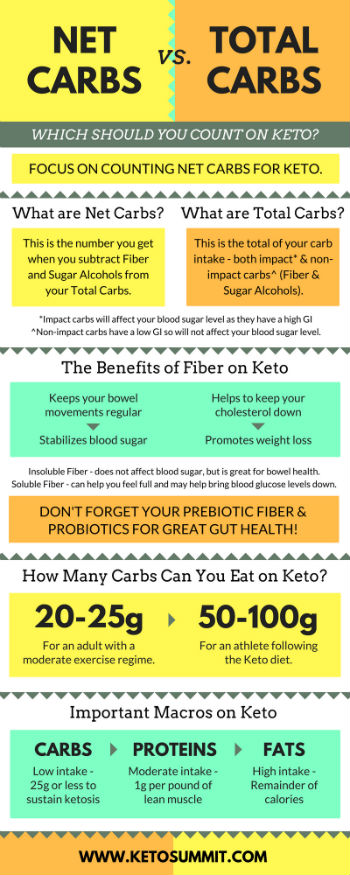Net Carbs vs Total Carbs – Which Should You Count On Keto?
If you’re just starting out on the Keto diet, your head might feel like it’s swimming with numbers.
In particular, you’re probably confused about carbs on keto. What’s the difference between net carbs and total carbs? Which should you be counting on Keto?
Check out our 2-minute video for a quick answer and then read the post for more details:
We’ll clear up all these issues and more for you today.
For starters, we’ll clarify the difference between net carbs and total carbs, so you can see why this distinction matters when you’re following the Ketogenic diet.
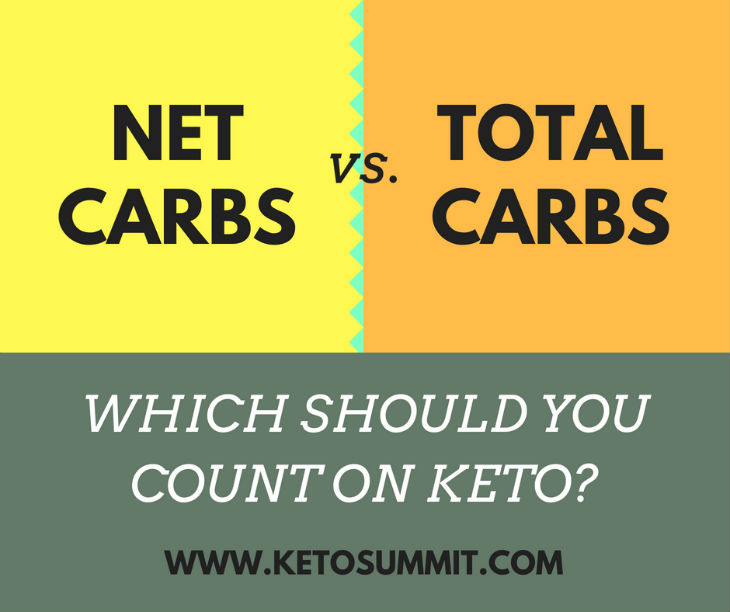
What are Net Carbs, and What are Total Carbs?
Not all carbs have the same effect on your system.
Dr. David Perlmutter, M.D. says, “Fiber, it turns out, is a form of carbohydrate, but is not a carbohydrate that has any effect on blood sugar or insulin response.”
He adds, “Therefore, the idea of focusing on net carbs, meaning the carbs that are left over when the fiber is removed from the equation, does make a lot of sense because it is these residual carbohydrates that strongly influence blood sugar and, consequently, insulin response.”
Carbohydrates can be divided into 2 main categories, impact and non-impact.
- Impact Carbs: Impact carbs have a high glycemic index (high-GI), and can dramatically affect your blood sugar levels. Some examples are white bread or rice, potatoes, and sugar. Unless they are immediately used to fuel some physical exertion, any surplus is stored as body fat.
- Non-Impact Carbs: Non-impact carbs come from the fiber in fruit, veggies, and whole grains, along with sugar alcohols. These low-GI carbs have a very low impact on blood sugar and are digested far more slowly. Because of this, they don’t tend to play havoc with your insulin.
Put simply, if you deduct fiber and sugar alcohols from the total amount of carbohydrates you consume, you’ll be left with net carbs.
Net Carbs = Total Carbs – Fiber
How Does Fiber Affect Your Carb Macros?
Dietary fiber is the indigestible part of plant foods, and it plays many roles aside from keeping your bowel movements regular. It can also help to keep your cholesterol down, stabilize blood sugar and promote weight loss. (1)
Registered Dietitian Rebecca Toutant, RD, says, “Fiber is a part of fruits, vegetables, and grains that our bodies cannot convert to energy. It passes through the GI system largely undigested. Along the way, it acts like a brush to clean out the intestine.”
Fiber can be categorized as soluble or insoluble. Your body needs both forms to thrive.
What is the difference between the two types? And does it matter which kind you eat when you’re tracking your carb macros?
First, we’ll glance at how soluble and insoluble fiber differ.
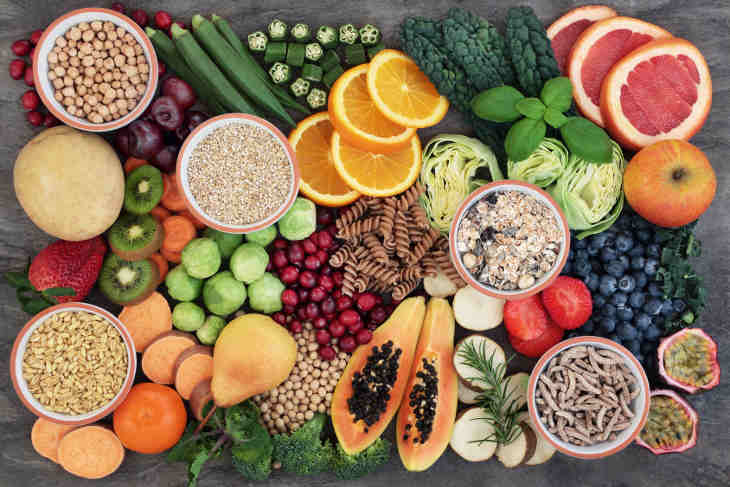
What is Insoluble Fiber?
Insoluble fiber cannot be absorbed and does not influence blood sugar or ketosis. Plant foods containing insoluble fiber include nuts, seeds, berries, and vegetables.
Consuming plenty of insoluble fiber is great for bowel health and it can also help long-term to maintain healthy blood sugar levels (2).
What is Soluble Fiber?
Soluble fiber attracts water during the digestion process, turning into a gel, which is helpful for slowing digestion and curbing hunger. Soluble fiber can be found in many whole foods, including oatmeal, apples, and blueberries.
When soluble fiber ferments in the colon, short-chain fatty acids (SCFAs) are produced. This process stimulates intestinal gluconeogenesis (IGN), or production of glucose in the intestine.
IGN was believed to boost blood sugar and consequently to affect ketosis. Indeed, it was this line of thought that led many experts to advise tracking total carbs rather than net carbs.
Recent evidence, though, has shown that soluble fiber can actually bring blood glucose levels down (3).
In fact, the fermentation of soluble fiber in the large intestine can actually help you feel full rather than hankering for a snack (4).
What is Prebiotic Fiber and Why Is It Essential For Good Gut Health?
Probiotics and prebiotics are essential for the digestive system to function properly.
Registered Dietitian Sherry Coleman Collins, RDN, LD explains, “Prebiotics are probiotic promoters or the fuel for good bacteria, which help manipulate the microbiome to support gastrointestinal health.”
Probiotics are live beneficial bacteria found in aged and fermented foods, including yogurt, sauerkraut, and kimchi. When eaten, they can increase the good bacteria living inside the gastrointestinal tract.
Why is this important? The microorganisms living in the gut have a profound impact on your health and well-being, affecting everything from your mood (5) to your metabolism (6). It appears that with good gut bacteria comes good health.
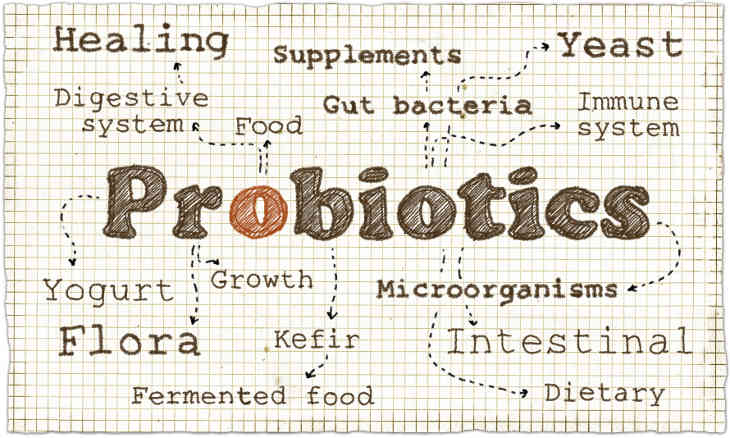
Probiotic bacteria, like all organisms, need food to survive – that’s where prebiotics come in…
Prebiotics are the non-digestible fiber in plant foods that feed these good bacteria living in your gut.
Consuming prebiotics has many health benefits. Feeding the good bacteria in the colon can lead to improved gut health, lowered risk factors for chronic illness, increased mineral absorption, and prevention of obesity (7).
Although there are no official guidelines for how much prebiotic fiber to eat, studies show health benefits with intakes between 3.5g and 7g per day (8). Raw veggies – especially onions, leeks, garlic, and asparagus – are all dense in prebiotic fiber.
As you can see, eating enough fiber – especially prebiotic fiber – is a crucial part of maintaining proper gut health. Fiber can help you feel fuller so it’s great if you’re aiming to lose weight on Keto.
So…
Moderation is the key to most things in life and you should now see why going Keto shouldn’t mean avoiding all vegetables and fiber.
So keep a good balance while making sure you still hit your macros – all the while enjoying enhanced gut health.
Which Should You Count On Keto?
In general, you should count net carbs on Keto.
That said, you should carefully analyze your reasons for following Keto and think about whether or not you’re particularly sensitive to carbs.
If you’re eating a low-carb, Ketogenic diet for weight loss, the determining factor may be feeling full for longer periods of time. As noted above, soluble fiber slows digestion, keeping you satisfied between meals. So, for the purposes of weight loss and overall health, tracking net carbs is highly effective.
Remember, though, there’s no right or wrong here. If you find that counting total carbs better aligns with your goals, that’s what you should do. If you’re using diet to manage a disease, this can often be the best approach.
Now that you know about the different ways in which you can calculate carb intake, how much carbohydrate should you eat?

How Many Carbs Can You Eat On Keto?
Opinion varies when it comes to what to shoot for with your carb macros.
We recommend 20-25g net carbs per day for an average person following a moderate exercise regime.
If you’re an athlete on Keto, you can safely dial this up to 50-100 grams of net carbs instead.
Whatever number you find works best for you, by eating a low-carb diet, you’ll feel naturally fuller so less inclined to overeat.
Although at heart Keto is all about keeping the carbs down, the role of fats and proteins is what separates Keto from many other low-carb eating plans. But just how important are they?
Macros On Keto – How Important Are They?
Macros are the 3 core macronutrients your body needs:
- Carbohydrates: Normally the body’s main source of fuel, this changes on Keto as we’ll explain below.
- Proteins: Critical for building and repairing muscle, protein also helps your immune system to function and helps with satiety (9).
- Fats: Fats play a fundamental role in nutrient absorption and overall wellbeing.
When following the Keto diet, you should eat few carbs, a moderate amount of protein and plenty of healthy fats.
By changing the ratio of the macronutrients you’re eating, you also change the way in which your body fuels itself. Rather than relying on carbohydrate for fuel, your body starts to use mainly fats instead.
As your body breaks down fat into fuel, ketones are produced. While in this fat-burning mode called ketosis, your body is able to harness energy from the fats and ketones in place of the glucose it relied on previously. If you are looking for exogenous ketones, Alex Cunningham does a great job of explaining them and what they are used for here.
- Carbs: 25g or less of net carbs will help you achieve and sustain ketosis.
- Proteins: Roughly 1g of protein per pound of lean muscle. Find out here how to calculate your lean muscle mass and body fat percentage.
- Fats: Fats will account for the remainder of your caloric allowance.
Bottom Line:
Macros are a key part of the Ketogenic diet, but once you’ve taken the time to calculate those macros, tracking them and staying on course is straightforward.
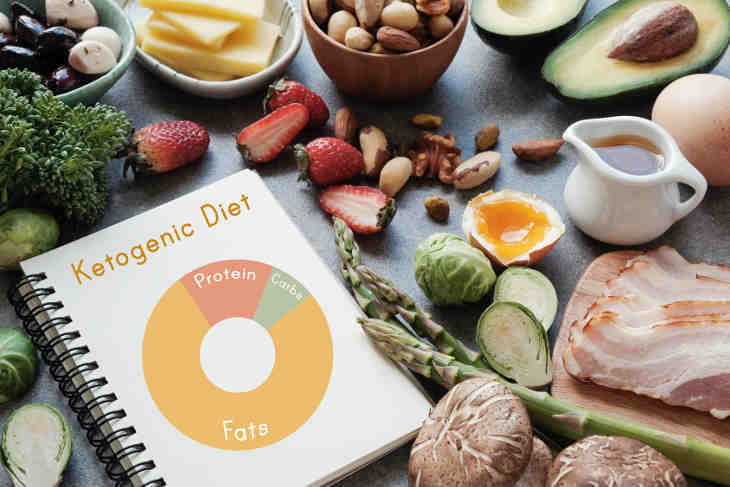
Do You Need To Count Calories On Keto?
If you have a headache from all those numbers, there’s some good news…
If you’re counting macros already then you’ll be counting calories by definition, as each gram of fat, protein, and carbs equate to a certain number of calories. Focus on maintaining your macro balance and you won’t need notebooks overflowing with numbers.
You should bear in mind that if you’re going Keto for weight loss purposes, you’ll need to recalculate your macros from time to time for best results.
Don’t Stress About Counting Carbs on Keto
Ultimately, Keto is about far more than just macros. It’s a way of life that will help you lose weight, gain energy, and approach your health and life with a new perspective.
Keto is designed to help you naturally cut out refined carbohydrates and sugars from your diet. This is an organic process and it may take time to adjust to a different way of cooking and eating.
So, when you first start Keto, if counting carbs is adding to your stress, then forget all about it. Nobody wants a diet that feels restrictive and involves too much by way of recording data. Just focus on removing the processed foods you’re used to eating and take it step-by-step.
Concluding Thoughts
Focus on net carbs for Keto, take in sufficient fiber, and you can hit your weight loss targets while enhancing your gut function and overall health.
Pinterest Image For Net Carbs vs Total Carbs – Which Should You Count On Keto?
Please pin the image below so that you and others can quickly and easily refer to the list and find out how to count net carbs and get more information about fiber and the Keto diet.
